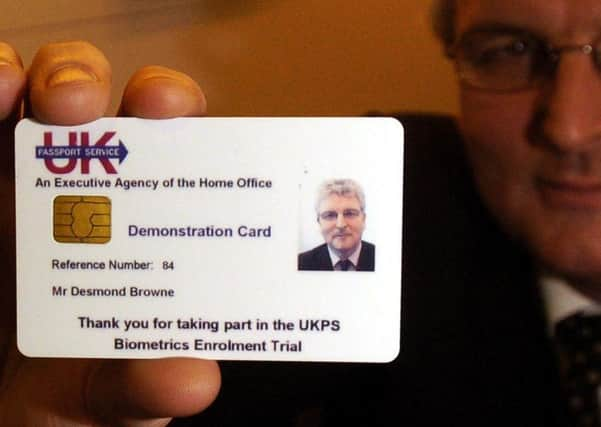Jim Killock: Put privacy first and ID system can be a boon


However, Scotland still has the legacy of a potentially very intrusive national identity system that has grown up in a highly ad hoc manner and urgently needs an overhaul – perhaps even dismantling entirely.
It may surprise people to hear that Scotland has a “national identity system”. If you looked for it on the statute books, you’d find nearly no mention of it at all. But the fact is that the key features of the widely disliked and now abandoned UK ID system, symbolised by the New Labour “Identity Card”, are shared by a parallel Scottish system.
Advertisement
Hide AdAdvertisement
Hide AdThe UK ID system was deemed dangerous by campaigners because it had the clear intention of linking people’s personal information across government. The ID Card would be linked to a Unique ID number, which would be attached to every record about you in government.
It would be trivially easy for a computer to search government records, and determine that you, Eric Blair, had got an average education, were currently unemployed, while appearing to stay at home more than was healthy for a job seeker and reading the wrong kind of library books for someone needing employment and training. From such “customer insights” New Labour hoped to target you with government “help”, and of course sanction you if you appeared to be avoiding your duties to the state.
The ID Card was never really the problem with Labour’s system, it was the impact of tracking people across every interaction with the government.
The same kind of thinking appears to have been applied in Scotland. Everyone in Scotland is assigned a “Unique Citizen Reference Number” (UCRN) at birth, under a legislative duty assigned to National Records of Scotland. This UCRN was to be utilised by the online “myaccount” logins, and the NHS, linking your activity made across each Scottish Government department.
The UCRN is already employed by the Scottish Entitlement Card, currently used as a bus pass, local library card and for student services in many colleges.
Between the Scottish Entitlement Card, UCRN, myaccount and repurposing of the NHS Register, the Scottish Government would have in place all the key elements of the UK Labour ID system: a voluntary ID Card; persistent linking of data across government, an online login system and a national ID database with the home address of nearly everyone in the country. All this despite its own Scottish identity principles insisting “persistent identifiers” like the UCRN should not be used.
The major difference between the Scottish and New Labour ID system is, however, that there is barely any legislation governing Scotland’s system.
The card system, for instance, is owned by a consortium of local councils and central government; users wanting education in certain colleges or free bus passes must “opt in”, or forgo the service. This structure also makes it very hard to know if the choice of such a centralised system is rational, or excessively expensive.
Advertisement
Hide AdAdvertisement
Hide AdThe promise of the current Scottish Government to review the way they approach identity and authentication is very welcome. It needs to look at all of these issues, and move on from the top-heavy, centralised model of the early 2000s. There are privacy-friendly ways to approach identity, that can put citizens in control of their relationships with government. These services can be less costly, and favour smaller technology businesses of the kind that are becoming increasingly successful in Scotland.
A truly Scottish identity system could protect rights and provide a major boost to the economy, rather than lumber Scotland with an expensive and unaccountable echo of the Blairite past.
Jim Killock is Executive Director of the Open Rights Group